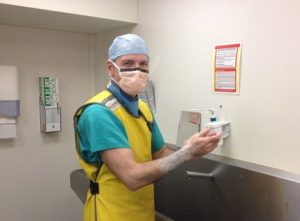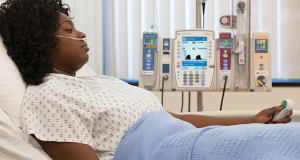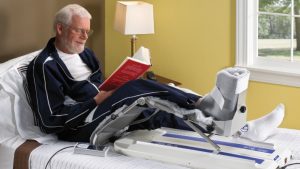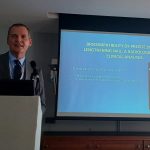The Day Before Surgery
You will visit the hospital the previous day from your surgery date for the pre-op checks , ECG and blood tests.

Later on, Dr Giotikas will also see you for a consultation, final review of your treatment plan and signing the informed consent form.
In the afternoon, the anaesthetist will see you in order to confirm the final details of your anaesthesia and perioperative analgesia.
You can then return to your accommodation for the rest of the day and return to hopsital for admission and surgery in the next morning. You will be given written instruction to refrain from solid food (including milk and juices with pulp) from after midnight. Clear fluids (water, tea, refreshements) are allowed until 03.00am.
Being in a foreign country and sleeping in a hotel room the night before a scheduled surgery is not the same as sleeping at home. If you prefer to be admitted (and sleep) in the hospital from the night before surgery feel free to discuss it with your surgeon or anaesthetist.
Surgery Day
On the day of surgery when you arrive (or wake up) to the ward, you will be prepared for theatre. This includes regular confirmations and checks about your identity, planned procedure, side of surgery etc. We need to be sure that we do “the right thing for the right patient”. The site of surgery will be washed with soap and you will wear disposable underwear and a theatre gown.
When it is time, you will be taken to theatre on a wheelchair or your bed, depending on your condition. There you will see again your anaesthetist and your surgeon and further regular checks and confirmations will follow according to WHO guidelines for safe surgery.
Intravenous catheter(s) will be placed to deliver medications through your vein and you will be anaesthetized as per anaesthetic plan. Then you will be positioned on the surgical table. If appropriate (for longer operations or certain types of anaesthesia) a urine catheter may need to be placed. Your genitalia will be covered throughout the operation.
Dr Giotikas will do the operation as per the preoperative plan.
When your surgery is finished you will remain at the recovery area for around one hour until the doctors are sure that it is safe for you to be transferred back to the ward. You will be given appropriate painkillers and other medications related to your surgery (antibiotics and anti-clotting and maybe anti-vomiting medication).
You will later return to your room on your bed. You will have a light meal and the physio team will see you and start some gentle exercises. Depending on the type of your surgery, you may even stand on your feet and make a few steps.
our surgeon and anaesthetist will visit you later on the day to confirm that everything is as expected after your surgery.
Hospital Stay
The next days of your hospital stay are mainly focused on your rehabilitation after the surgery and the prevention, prompt diagnosis and management of any immediate postoperative complications.
Blood Loss
Blood loss is always a peri-operative consideration. We use approved protocols to monitor the blood loss in real time so we can intervene promptly if needed. We use NICE protocols to minimize the blood loss and the need for transfusion. Mediterraneo Hospital has a state of the art blood transfusion unit certified by ISO and Temos.
Pain Management
For the first 24 hours you will have continuous pain control with a special  device which you will control fully. It is called PCA (patient -Controlled Analgesia). It practically means that you will be having a little device with a button which you will push whenever you feel that the pain increases. The device is set to administer a certain amount of pain control medicine each time you press the button. Don’t worry, it is set to pause automatically when adequate drug has been given so you cannot overdose yourself, even if you press it all the time! An alternative to PCA is the nerve blocking of the operated limb which numbs the nerves and the feeling of pain on the operated limb for the first post-operative day.
device which you will control fully. It is called PCA (patient -Controlled Analgesia). It practically means that you will be having a little device with a button which you will push whenever you feel that the pain increases. The device is set to administer a certain amount of pain control medicine each time you press the button. Don’t worry, it is set to pause automatically when adequate drug has been given so you cannot overdose yourself, even if you press it all the time! An alternative to PCA is the nerve blocking of the operated limb which numbs the nerves and the feeling of pain on the operated limb for the first post-operative day.
Physiotherapy
Physiotherapy starts from the day of surgery with the aim to make you confident with mobilizing and with performing tasks of daily life after the operation.
 Two days before your scheduled discharge your personalized physio program, that you will follow after your discharge from the hospital, will be explained to you. At this point you will also have the opportunity to meet the members of our physio team who will be looking after you when you leave the hospital.
Two days before your scheduled discharge your personalized physio program, that you will follow after your discharge from the hospital, will be explained to you. At this point you will also have the opportunity to meet the members of our physio team who will be looking after you when you leave the hospital.
Some serious complications may occur during the first postoperative days (and some times later). Fat embolism, blood clots and thromboembolism, infection. Mediterraneo hospital has all the diagnostic means to timely diagnose any of these conditions and the treatment facilities to manage them according to the highest standards of efficiency and safety (see more about the ICU of Mediterraneo Hospital).
Discharge ftom Ward
When it is safe and comfortable, you will leave the hospital. The hospital will issue an itinerary and a medical discharge report (in English and in the language of your preference) stating:
- the diagnosis of admission,
- the interventions that were undertaken,
- the implants that were implanted
- the outcome
- Post-surgery instructions and medications
- Follow up instructions





